Module 10 Spring Festival导学案(5课时无答案)
文档属性
| 名称 | Module 10 Spring Festival导学案(5课时无答案) |
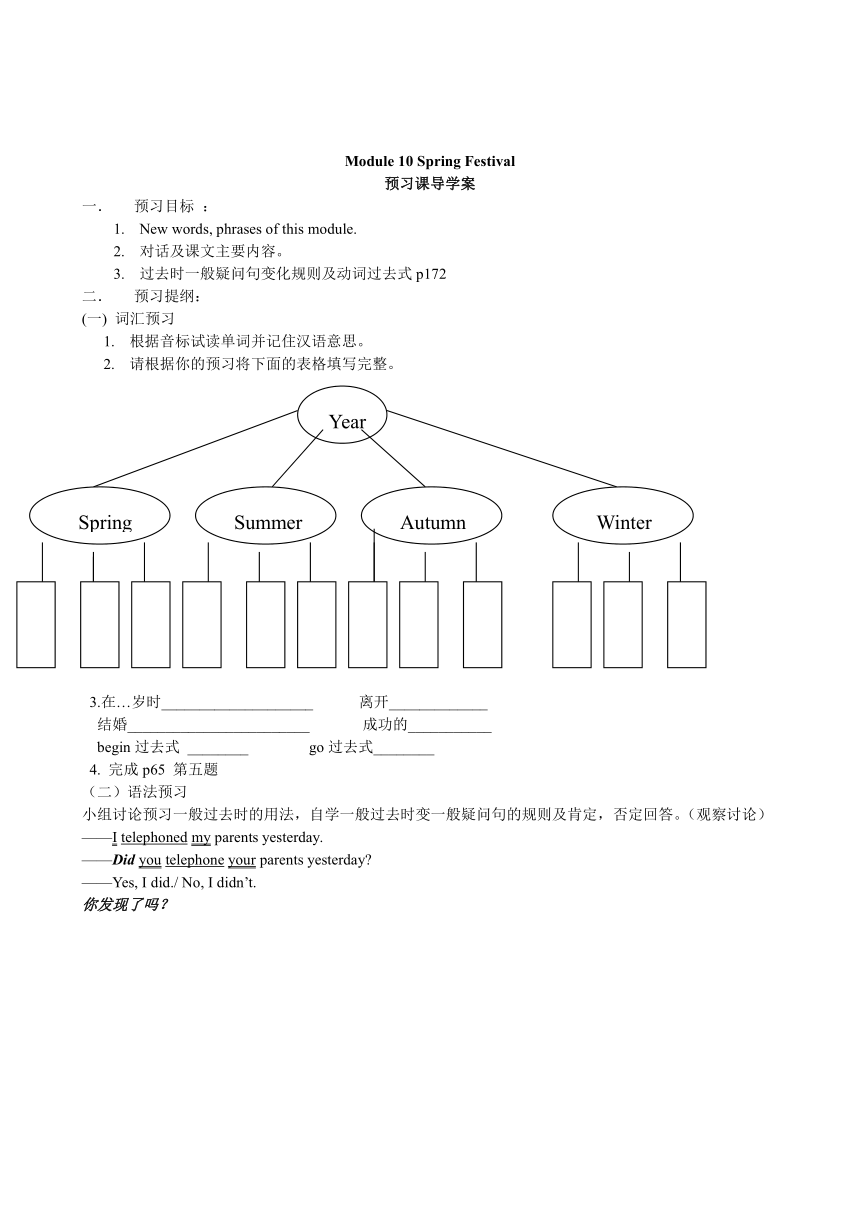
|
|
| 格式 | doc | ||
| 文件大小 | 51.6KB | ||
| 资源类型 | 教案 | ||
| 版本资源 | 外研版 | ||
| 科目 | 英语 | ||
| 更新时间 | 2022-10-26 00:00:00 | ||
图片预览

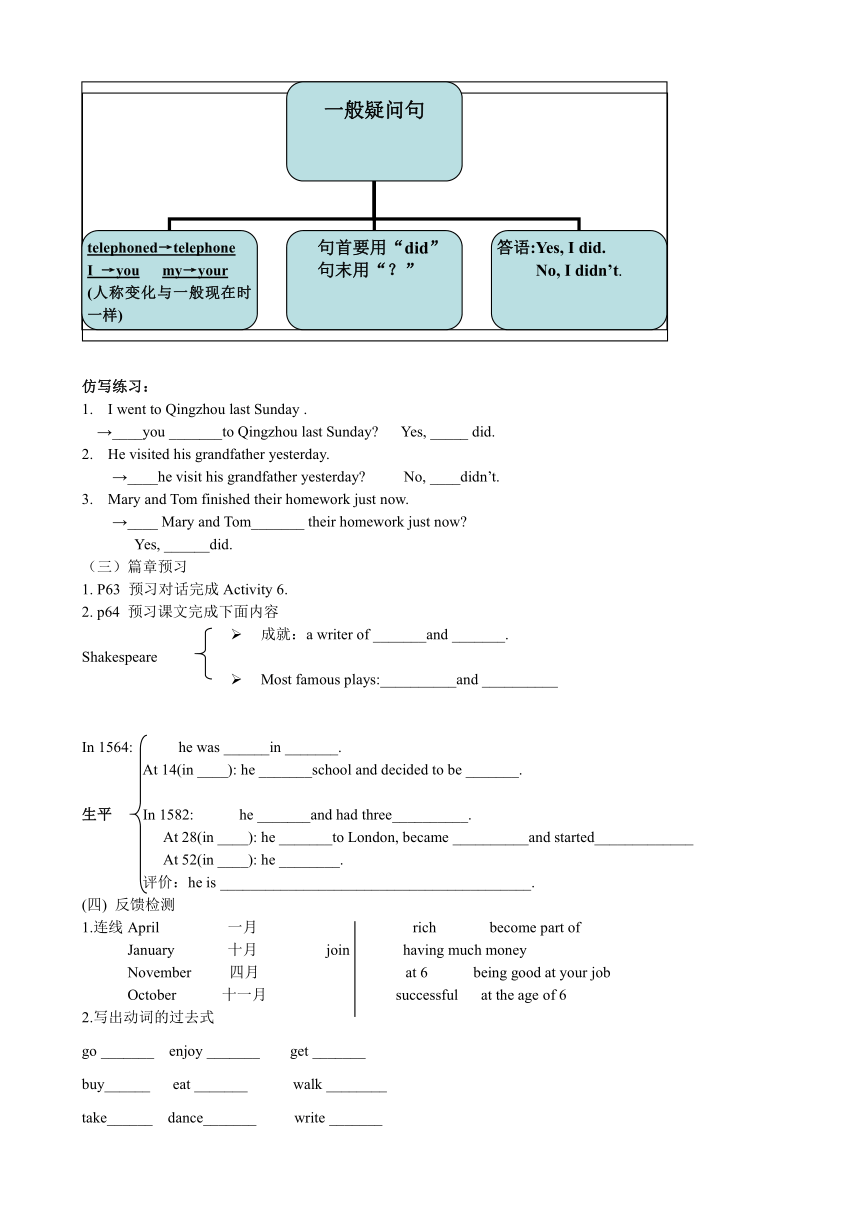
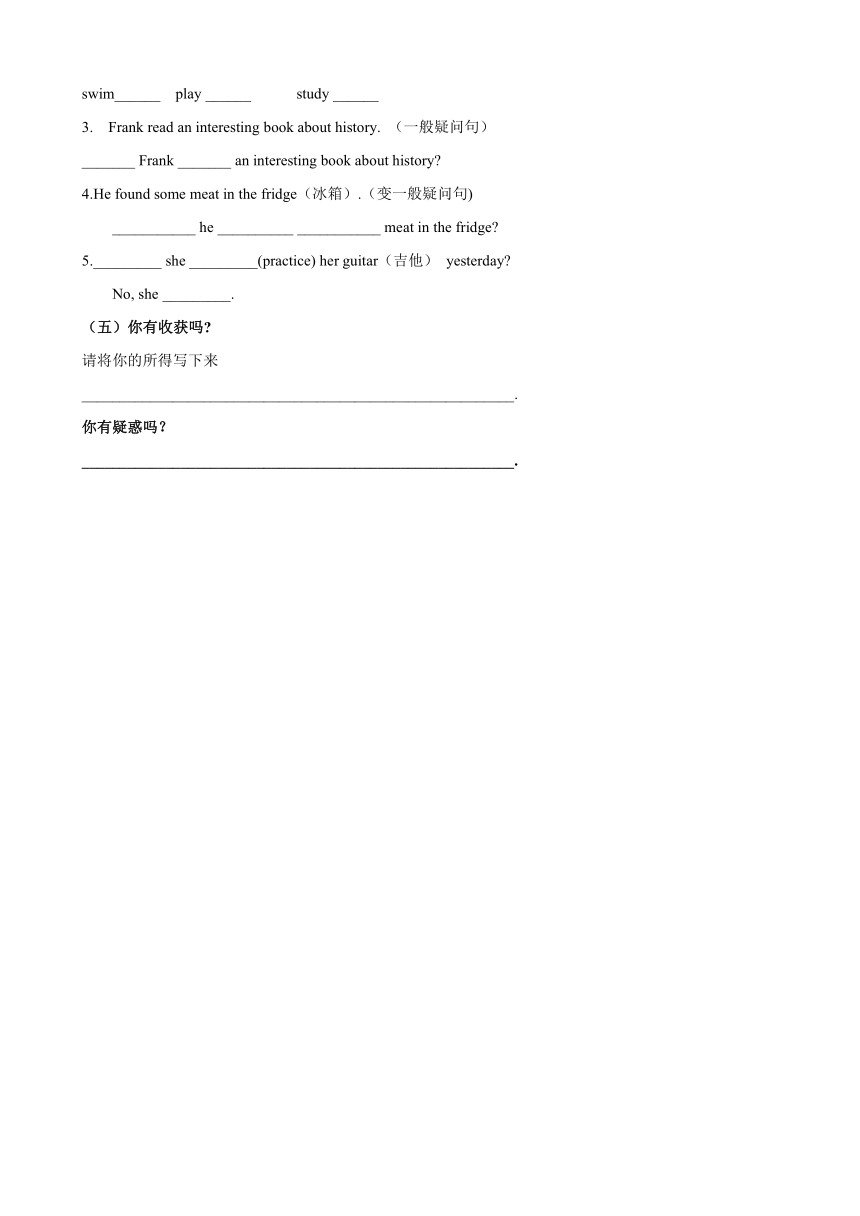
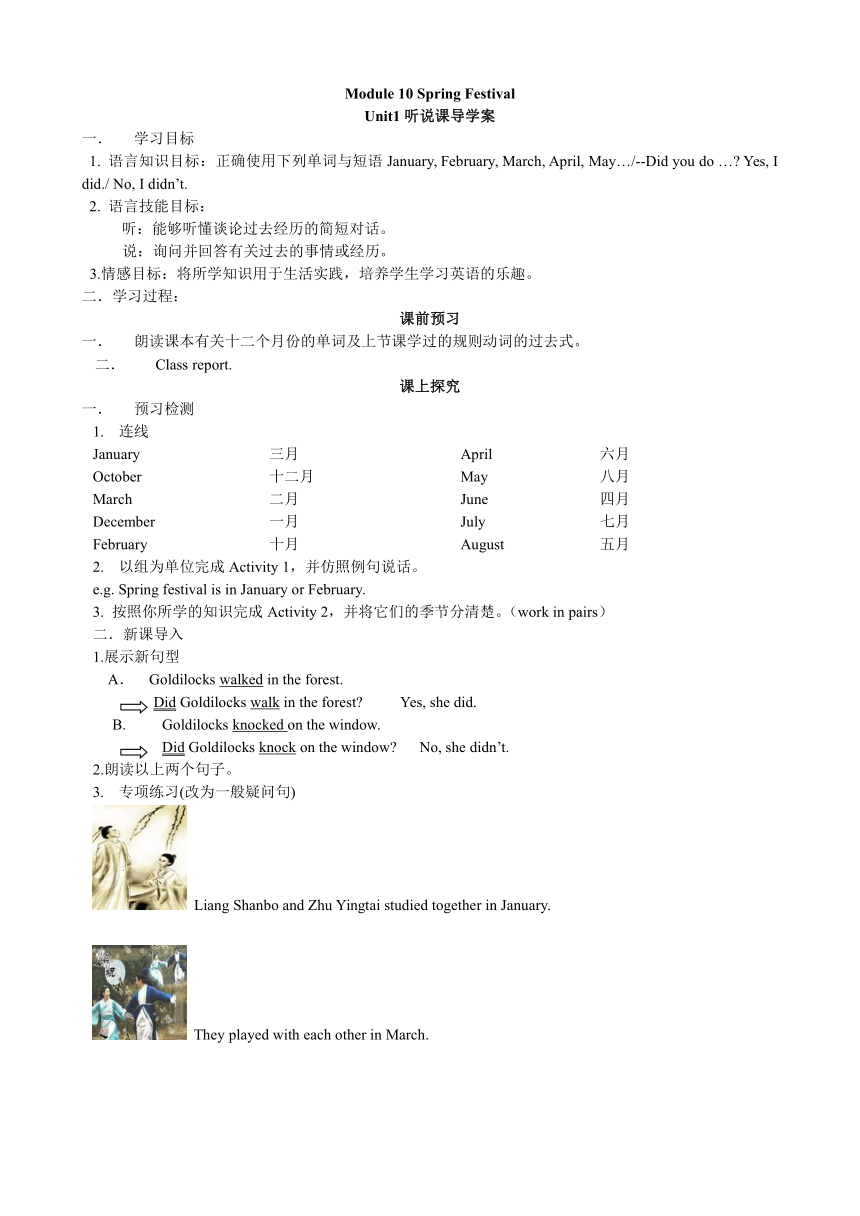
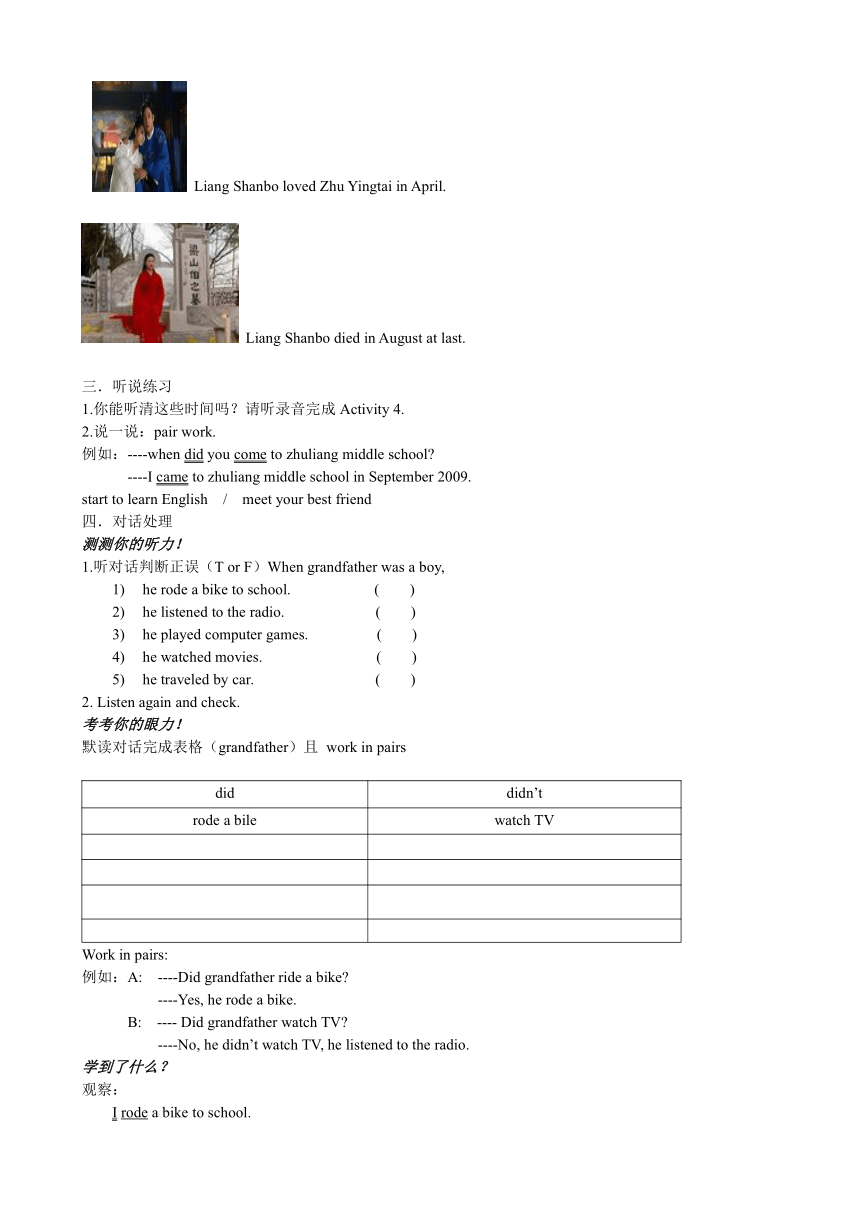
文档简介
Module 10 Spring Festival
预习课导学案
预习目标 :
New words, phrases of this module.
对话及课文主要内容。
过去时一般疑问句变化规则及动词过去式p172
预习提纲:
(一) 词汇预习
根据音标试读单词并记住汉语意思。
请根据你的预习将下面的表格填写完整。
(
Y
ear
Spring
S
ummer
A
utumn
W
inter
)
3.在…岁时____________________ 离开_____________
结婚________________________ 成功的___________
begin过去式 ________ go过去式________
4. 完成p65 第五题
(二)语法预习
小组讨论预习一般过去时的用法,自学一般过去时变一般疑问句的规则及肯定,否定回答。(观察讨论)
——I telephoned my parents yesterday.
——Did you telephone your parents yesterday
——Yes, I did./ No, I didn’t.
你发现了吗?
(
一般疑问句
telephoned
→
telephone
I
→
you
my
→
your
(
人称变化与一般现在时一样
)
句首要用“
did
”
句末用“?”
答语
:Yes,
I
did.
No,
I
didn
’
t
.
)
仿写练习:
I went to Qingzhou last Sunday .
→____you _______to Qingzhou last Sunday Yes, _____ did.
He visited his grandfather yesterday.
→____he visit his grandfather yesterday No, ____didn’t.
Mary and Tom finished their homework just now.
→____ Mary and Tom_______ their homework just now
Yes, ______did.
(三)篇章预习
1. P63 预习对话完成Activity 6.
2. p64 预习课文完成下面内容
成就:a writer of _______and _______.
Shakespeare
Most famous plays:__________and __________
In 1564: he was ______in _______.
At 14(in ____): he _______school and decided to be _______.
生平 In 1582: he _______and had three__________.
At 28(in ____): he _______to London, became __________and started_____________
At 52(in ____): he ________.
评价:he is _________________________________________.
(四) 反馈检测
1.连线April 一月 rich become part of
January 十月 join having much money
November 四月 at 6 being good at your job
October 十一月 successful at the age of 6
2.写出动词的过去式
go _______ enjoy _______ get _______
buy______ eat _______ walk ________
take______ dance_______ write _______
swim______ play ______ study ______
3. Frank read an interesting book about history. (一般疑问句)
_______ Frank _______ an interesting book about history
4.He found some meat in the fridge(冰箱).(变一般疑问句)
___________ he __________ ___________ meat in the fridge
5._________ she _________(practice) her guitar(吉他) yesterday
No, she _________.
(五)你有收获吗
请将你的所得写下来
_________________________________________________________.
你有疑惑吗?
_________________________________________________________.
Module 10 Spring Festival
Unit1听说课导学案
学习目标
1. 语言知识目标:正确使用下列单词与短语January, February, March, April, May…/--Did you do … Yes, I did./ No, I didn’t.
2. 语言技能目标:
听:能够听懂谈论过去经历的简短对话。
说:询问并回答有关过去的事情或经历。
3.情感目标:将所学知识用于生活实践,培养学生学习英语的乐趣。
二.学习过程:
课前预习
朗读课本有关十二个月份的单词及上节课学过的规则动词的过去式。
Class report.
课上探究
预习检测
连线
January 三月 April 六月
October 十二月 May 八月
March 二月 June 四月
December 一月 July 七月
February 十月 August 五月
以组为单位完成Activity 1,并仿照例句说话。
e.g. Spring festival is in January or February.
3. 按照你所学的知识完成Activity 2,并将它们的季节分清楚。(work in pairs)
二.新课导入
1.展示新句型
A. Goldilocks walked in the forest.
Did Goldilocks walk in the forest Yes, she did.
Goldilocks knocked on the window.
Did Goldilocks knock on the window No, she didn’t.
2.朗读以上两个句子。
专项练习(改为一般疑问句)
Liang Shanbo and Zhu Yingtai studied together in January.
They played with each other in March.
Liang Shanbo loved Zhu Yingtai in April.
Liang Shanbo died in August at last.
三.听说练习
1.你能听清这些时间吗?请听录音完成Activity 4.
2.说一说:pair work.
例如:----when did you come to zhuliang middle school
----I came to zhuliang middle school in September 2009.
start to learn English / meet your best friend
四.对话处理
测测你的听力!
1.听对话判断正误(T or F)When grandfather was a boy,
he rode a bike to school. ( )
he listened to the radio. ( )
he played computer games. ( )
he watched movies. ( )
he traveled by car. ( )
2. Listen again and check.
考考你的眼力!
默读对话完成表格(grandfather)且 work in pairs
did didn’t
rode a bile watch TV
Work in pairs:
例如:A: ----Did grandfather ride a bike
----Yes, he rode a bike.
B: ---- Did grandfather watch TV
----No, he didn’t watch TV, he listened to the radio.
学到了什么?
观察:
I rode a bike to school.
→ Did you ride a bike to school
合作完成(变为一般疑问句)
we listened to the radio.
we had games like chess.
we travelled by train。
仔细听哦!
ride a bike to school=go to school by bike
be born 生于 e.g. I was born in Qingzhou.
动动嘴吧!分角色朗读
五.学以致用
请你以记者的身份分别采访组内成员,询问他们起床早晚(get up early),是否吃早饭(have the breakfast),是否喜欢看电视(watch TV),是否完成作业(finish your homework)。并做好记录。
注意采访时要用“----Did you get up early?
----Yes, I did./ No, I didn’t.”的句式。
课后延伸
复习巩固:复习当天所学并将对话中含一般过去时的一般疑问句的句子记住。
拓展作业:用学过的句型采访家长,记录他们一天中所做的事。
预习:下一单元,查阅相关人物资料。
Module 10 Spring Festival
Unit2读写课导学案
学习目标
1. 语言知识目标:正确使用下列单词与短语be born, start school,finish school,move to,theatre company…
2. 语言技能目标:
读:能够读懂简单的人物传记,掌握段落大意。
写:能用一般过去时描述自己或他人的经历。
3.情感目标:通过对莎士比亚的了解,培养对文学家的崇敬之情与对文学的兴趣。
二.学习过程
课前延伸
1. 预习词汇be born, start school,finish school,move to,theatre company…(会读,了解意思)
2.class report
课内探究
一.测测你的收获吧!连线
Be born 毕业 骑车上学 October
Finish school 生于 八月 marry
Theatre company 搬到 十月 August
Move to 剧团 结婚 ride a bike to school
二.导入:同学们,大家知道梁山伯与祝英台的故事吧,在国外也有一部类似的剧作,非常有名,你们知道它是什么吗?看一下右边这幅图,有没有勾起你的一些回忆?下面我们一起来读一下这篇文章,了解一下这位伟大的剧作家的一生!
三.阅读训练
(一)快速阅读(略读)回答问题
1.Who was William Shakespear?
2.Did Queen Elizabeth I enjoy Shakespear’s plays
(二) 细节阅读(精读)回答问题
1.读第一段回答问题:
(1)what are Shakespear’s most famous plays
___________________
(2)when and where was Shakespear born
____________________________________________
2.读第二段回答问题:
True or false
(1) Before he started school, he liked watching plays. ( )
(2) He finished school at 16. ( )
(3) He decided to be an actor. ( )
3.读第三、四段回答问题:
(1) At 28 he moved to London.(改为同义句)
____ ____ _____ __ ___ he moved to London.
(2) Where did the company opened the Globe Theatre in 1599
__________________________________________________
4. 读第五段回答问题:
(1) when did Shakespear die
__________________________
(2) Can you still see Shakespear’s plays in English and in many other languages
_____________________________
四.新知学习
1. ※决定做某事_______________ 2.生于___________________
3. ※喜欢做某事_______________ 4. 搬到___________________
5. ※在…岁时_______/______________/______________________
6.剧团____________________ 7….之一____________________
8.一名成功的演员__________________________
9. ※开始做某事________________ 10.在泰晤士河畔____________
测吧!
小组讨论将带星花的短语仿照例句造句:
At the age of 8/at 8 /when I was 8 years old, I went to school.
Tom decided to make a pizza.
Mary likes singing songs.
Later, he started asking questions.
五.测测你的记忆力!根据关键词复述课文
William shakespear …writer of plays and poems. ---Born …1564. ---finish school …1578.---marry…1582.---move to…1592.---die…1616.
六.写作训练
Write sentences about your life when you were 10 years old.
Travel / to school by car
→At the aged of 10,I didn’t travel to school by car. I walked to school with my mother.
1.play / football 2.want / to learn piano
3.work / hard 4.listen / to the music
课后延伸
Homework : 仿照课文写一写你从出生到现在的事,如某一年做了什么事。
Module 10 Spring Festival
语法课导学案
学习目标:掌握一般过去时的疑问句形式及答语。
学习过程
课前预习
朗读学过的动词过去式。
class report.
课上探究
火眼金睛看真相
观察下列句子,注意左右两边的不同,并讨论回答下列问题
陈述句 一般疑问句
I watched TV yesterday. Did you watch TV
We played chess last night. Did you play chess last night
He visited his aunt last Sunday. Did he visit his aunt last Sunday
My sister started school at 6. Did your sister start school at 6
提问:1.右边一般疑问句以 _______开头?
2.watched→_________
visited→_________
played→_________
左边三个词是右边三个词的__________
3.人称:第一人称变为第____人称。
二.合作学习效率高——你能讨论完成吗?
1.一般过去时的一般疑问句形式同一般现在时一样,也是在句首加助动词构成,即助动词_______
2.一般疑问句中的谓语动词要变成相应的___________.
三.竖起耳朵听一听
肯定 Yes, 主语代词+did
一般疑问句回答: 否定 No, 主语代词+didn’t
动动手指练一练
用所给词的适当形式填空
1)Tom and Mary ___________ (come) to China last month.
2)Mary __________ (read) English yesterday morning.
3)There _________ (be) no one here a moment ago.
4)I ___________ (call) Mike this morning.
5)I listened but ___________ (hear) nothing.
6)Tom ___________ (begin) to learn Chinese last year.
7)Last week we _________ (pick) many apples on the farm.
8)My mother ________________ (not do) housework yesterday.
2.请将上面句子中前五个变为一般疑问句,并作出肯定及否定回答。
如:Did Tom and Mary come to China last month?
Yes, they did./ No,they didn’t.
3.将第一题中前五个句子改为否定句。
4.找找句子中的错误并改正
1.How is Jane yesterday _____________________
2.He go to school by bus last week. __________________________
3.Did you saw him just now. ________________________________
4.Tom wasn’t watch TV last night. __________________________
5.Does he wait for you three hours ago. ______________________
五.综合运用
1. The children had a good time in the park.
否定句:__________________________________________
一般疑问句:________________________________________
2. Last week I read an English book.
否定句:__________________________________________
一般疑问句:________________________________________
肯定/否定回答:____________________________________
3. Frank read an interesting book about history. (一般疑问句)
_______ Frank _______ an interesting book about history
4.Emma每天都练习弹吉他。可是昨天他没有练习。他为数学考试作准备了。
Emma _______ the guitar every day. But he ____ _______ yesterday.
课后延伸
一.总结记忆过去时一般疑问句的规则用法。
二.日记一则,字数50-60记叙一天的活动如起床,吃饭,上学,上午的课程。
Module 10 Spring Festival
复习课导学案
一.复习内容:单词,短语,句型(过去时一般疑问句及答语)
二.复习方法:根据提示自主复习对话,课文,语法
三.复习检测
1.词汇考察
(1)He decided to be an a________.
(2) Li Bai was a famous writer of p______.
(3) Mr Smith has much money . That is to say he is r______.
(4) In the north of China, it usually n_____in winter.
(5) Teacher’s Day is in S_________.
(6) Spring includes M________,A________and M_________.
2.英汉互译
离开______________ 在…岁时_______________
骑车上学_____________ 听收音机_______________
在海边_______________ 玩电脑游戏_____________
decide to do____________ like doing sth_____________
生于_______________ 在学校__________________
finish school_____________ start doing sth____________
在泰晤士河畔_____________ move to _________________
3.动词适当形式填空
(1). I _________ (have) an exciting party last weekend.
(2). ____ she _____(practice) her guitar(吉他)yesterday No, she _________.
(3). They all _____(go) to the mountains(高山) yesterday morning.
(4). She _________(not visit) her aunt last weekend.
She ________ (stay) at home and _________(do) some cleaning.
(5). When ____you _____(write) this song歌 I ____(write) it last year.
4.按要求做题
(1)Jenny喜欢看书。昨晚她看了一本英语书。
Jenny likes _________ __________. She _________ an English book last night.
(2) Emma每天都看电视。可是昨天他没有看。
Emma __________ TV every day. But he ______ _____yesterday.
(3) Lucy did her homework at home.(改否定句)
Lucy ___________ ___________ her homework at home.
(4) Thomas spent RMB 10 on this book. (一般疑问句)
________________________________________
四.疑难解答,总结知识点。
五.小组讨论,自主梳理知识脉络
课后检测题
一.词汇检测题
A) 写出英文的十二个月份。
1. 一月 ________ 7.七月________
2. 二月 ________ 8.八月________
3. 三月 ________ 9.九月________
4. 四月 ________ 10.十月________
5. 五月 ________ 11.十一月________
6. 六月 ________ 12.十二月________
B) 根据汉语提示写出单词。
1. There is a _____ (富裕) man in the east of the town.
2. Yuan Longping is a __________(成功的) scientist.
3. It will _____(下雪) tomorrow.
二.单项选择。
1. Our family _______ Shanghai last year.
A. moved B. moved to C. moves
2. Did you _______ in the summer
A. go B. go to C. go away
3. I was born _______ July 1980.
A. in B. on C. at
4. We went to Qingdao on _______.
A. June B. April 4 C. the winter
5. The girl and the young man ________in 2002.
A. married B. married with C. married to
6. At that time my grandfather had games_______ chess.
A. at B. like C. for
7. — Did you have a computer in 2000
— _____________
A. Yes, we did. B. No, we don’t. C. Yes, I do.
8. — Do you have a car
— Yes, I do. But I ________ have one last year.
A. didn’t B. don’t C. not
9. He decided __________ a doctor when he finished school.
A. to be B. to do C. want to
10. Betty started _______ poems when she was five.
A. write B. writing C. writes
三. 按要求完成句子。
1. Do you go to school by bike everyday (同义句)
Do you ____ _ ____ ____ _______every day
2. When I was 7 years old, I started school. (同义句)
___ ___ ____ __ 7, I started school.
3. 他是世界上最著名的作家之一。(汉译英)
He is one of _____ _____ _____ writers in the world.
4. 莎士比亚是一位剧作家兼诗人。(汉译英)
Shakespeare was a writer _____ _____ _____ ______.
四. 将下列句子分别变成否定句和一般疑问句,并作出肯定回答。
1. She finished her homework yesterday.
___________________________________
___________________________________
___________________________________
2. We visited our teacher last night.
_________________________________
_________________________________
_________________________________
3. She walked to school last term.
_______________________________
______________________________
______________________________
4. The new music teacher arrived last night.
______________________________
______________________________
______________________________
五. 选择单词的正确形式填空。
be be born become decide die finish have like live
marry move start work join
William Shakespeare _______ in 1564 in England. When he ___ at school he_____ watching plays and he _______ to be an actor. He _______ school when he was 14 years old. When he was 18 he _______ , and they_____ three children. When he was 28 he ______ to London and _____ a theatre company. He_______ a successful actor and ______ writing plays. He ______ at the Globe Theatre. William Shakespeare _____ for 52 years. Finally, when he _____ he was rich and successful.
预习课导学案
预习目标 :
New words, phrases of this module.
对话及课文主要内容。
过去时一般疑问句变化规则及动词过去式p172
预习提纲:
(一) 词汇预习
根据音标试读单词并记住汉语意思。
请根据你的预习将下面的表格填写完整。
(
Y
ear
Spring
S
ummer
A
utumn
W
inter
)
3.在…岁时____________________ 离开_____________
结婚________________________ 成功的___________
begin过去式 ________ go过去式________
4. 完成p65 第五题
(二)语法预习
小组讨论预习一般过去时的用法,自学一般过去时变一般疑问句的规则及肯定,否定回答。(观察讨论)
——I telephoned my parents yesterday.
——Did you telephone your parents yesterday
——Yes, I did./ No, I didn’t.
你发现了吗?
(
一般疑问句
telephoned
→
telephone
I
→
you
my
→
your
(
人称变化与一般现在时一样
)
句首要用“
did
”
句末用“?”
答语
:Yes,
I
did.
No,
I
didn
’
t
.
)
仿写练习:
I went to Qingzhou last Sunday .
→____you _______to Qingzhou last Sunday Yes, _____ did.
He visited his grandfather yesterday.
→____he visit his grandfather yesterday No, ____didn’t.
Mary and Tom finished their homework just now.
→____ Mary and Tom_______ their homework just now
Yes, ______did.
(三)篇章预习
1. P63 预习对话完成Activity 6.
2. p64 预习课文完成下面内容
成就:a writer of _______and _______.
Shakespeare
Most famous plays:__________and __________
In 1564: he was ______in _______.
At 14(in ____): he _______school and decided to be _______.
生平 In 1582: he _______and had three__________.
At 28(in ____): he _______to London, became __________and started_____________
At 52(in ____): he ________.
评价:he is _________________________________________.
(四) 反馈检测
1.连线April 一月 rich become part of
January 十月 join having much money
November 四月 at 6 being good at your job
October 十一月 successful at the age of 6
2.写出动词的过去式
go _______ enjoy _______ get _______
buy______ eat _______ walk ________
take______ dance_______ write _______
swim______ play ______ study ______
3. Frank read an interesting book about history. (一般疑问句)
_______ Frank _______ an interesting book about history
4.He found some meat in the fridge(冰箱).(变一般疑问句)
___________ he __________ ___________ meat in the fridge
5._________ she _________(practice) her guitar(吉他) yesterday
No, she _________.
(五)你有收获吗
请将你的所得写下来
_________________________________________________________.
你有疑惑吗?
_________________________________________________________.
Module 10 Spring Festival
Unit1听说课导学案
学习目标
1. 语言知识目标:正确使用下列单词与短语January, February, March, April, May…/--Did you do … Yes, I did./ No, I didn’t.
2. 语言技能目标:
听:能够听懂谈论过去经历的简短对话。
说:询问并回答有关过去的事情或经历。
3.情感目标:将所学知识用于生活实践,培养学生学习英语的乐趣。
二.学习过程:
课前预习
朗读课本有关十二个月份的单词及上节课学过的规则动词的过去式。
Class report.
课上探究
预习检测
连线
January 三月 April 六月
October 十二月 May 八月
March 二月 June 四月
December 一月 July 七月
February 十月 August 五月
以组为单位完成Activity 1,并仿照例句说话。
e.g. Spring festival is in January or February.
3. 按照你所学的知识完成Activity 2,并将它们的季节分清楚。(work in pairs)
二.新课导入
1.展示新句型
A. Goldilocks walked in the forest.
Did Goldilocks walk in the forest Yes, she did.
Goldilocks knocked on the window.
Did Goldilocks knock on the window No, she didn’t.
2.朗读以上两个句子。
专项练习(改为一般疑问句)
Liang Shanbo and Zhu Yingtai studied together in January.
They played with each other in March.
Liang Shanbo loved Zhu Yingtai in April.
Liang Shanbo died in August at last.
三.听说练习
1.你能听清这些时间吗?请听录音完成Activity 4.
2.说一说:pair work.
例如:----when did you come to zhuliang middle school
----I came to zhuliang middle school in September 2009.
start to learn English / meet your best friend
四.对话处理
测测你的听力!
1.听对话判断正误(T or F)When grandfather was a boy,
he rode a bike to school. ( )
he listened to the radio. ( )
he played computer games. ( )
he watched movies. ( )
he traveled by car. ( )
2. Listen again and check.
考考你的眼力!
默读对话完成表格(grandfather)且 work in pairs
did didn’t
rode a bile watch TV
Work in pairs:
例如:A: ----Did grandfather ride a bike
----Yes, he rode a bike.
B: ---- Did grandfather watch TV
----No, he didn’t watch TV, he listened to the radio.
学到了什么?
观察:
I rode a bike to school.
→ Did you ride a bike to school
合作完成(变为一般疑问句)
we listened to the radio.
we had games like chess.
we travelled by train。
仔细听哦!
ride a bike to school=go to school by bike
be born 生于 e.g. I was born in Qingzhou.
动动嘴吧!分角色朗读
五.学以致用
请你以记者的身份分别采访组内成员,询问他们起床早晚(get up early),是否吃早饭(have the breakfast),是否喜欢看电视(watch TV),是否完成作业(finish your homework)。并做好记录。
注意采访时要用“----Did you get up early?
----Yes, I did./ No, I didn’t.”的句式。
课后延伸
复习巩固:复习当天所学并将对话中含一般过去时的一般疑问句的句子记住。
拓展作业:用学过的句型采访家长,记录他们一天中所做的事。
预习:下一单元,查阅相关人物资料。
Module 10 Spring Festival
Unit2读写课导学案
学习目标
1. 语言知识目标:正确使用下列单词与短语be born, start school,finish school,move to,theatre company…
2. 语言技能目标:
读:能够读懂简单的人物传记,掌握段落大意。
写:能用一般过去时描述自己或他人的经历。
3.情感目标:通过对莎士比亚的了解,培养对文学家的崇敬之情与对文学的兴趣。
二.学习过程
课前延伸
1. 预习词汇be born, start school,finish school,move to,theatre company…(会读,了解意思)
2.class report
课内探究
一.测测你的收获吧!连线
Be born 毕业 骑车上学 October
Finish school 生于 八月 marry
Theatre company 搬到 十月 August
Move to 剧团 结婚 ride a bike to school
二.导入:同学们,大家知道梁山伯与祝英台的故事吧,在国外也有一部类似的剧作,非常有名,你们知道它是什么吗?看一下右边这幅图,有没有勾起你的一些回忆?下面我们一起来读一下这篇文章,了解一下这位伟大的剧作家的一生!
三.阅读训练
(一)快速阅读(略读)回答问题
1.Who was William Shakespear?
2.Did Queen Elizabeth I enjoy Shakespear’s plays
(二) 细节阅读(精读)回答问题
1.读第一段回答问题:
(1)what are Shakespear’s most famous plays
___________________
(2)when and where was Shakespear born
____________________________________________
2.读第二段回答问题:
True or false
(1) Before he started school, he liked watching plays. ( )
(2) He finished school at 16. ( )
(3) He decided to be an actor. ( )
3.读第三、四段回答问题:
(1) At 28 he moved to London.(改为同义句)
____ ____ _____ __ ___ he moved to London.
(2) Where did the company opened the Globe Theatre in 1599
__________________________________________________
4. 读第五段回答问题:
(1) when did Shakespear die
__________________________
(2) Can you still see Shakespear’s plays in English and in many other languages
_____________________________
四.新知学习
1. ※决定做某事_______________ 2.生于___________________
3. ※喜欢做某事_______________ 4. 搬到___________________
5. ※在…岁时_______/______________/______________________
6.剧团____________________ 7….之一____________________
8.一名成功的演员__________________________
9. ※开始做某事________________ 10.在泰晤士河畔____________
测吧!
小组讨论将带星花的短语仿照例句造句:
At the age of 8/at 8 /when I was 8 years old, I went to school.
Tom decided to make a pizza.
Mary likes singing songs.
Later, he started asking questions.
五.测测你的记忆力!根据关键词复述课文
William shakespear …writer of plays and poems. ---Born …1564. ---finish school …1578.---marry…1582.---move to…1592.---die…1616.
六.写作训练
Write sentences about your life when you were 10 years old.
Travel / to school by car
→At the aged of 10,I didn’t travel to school by car. I walked to school with my mother.
1.play / football 2.want / to learn piano
3.work / hard 4.listen / to the music
课后延伸
Homework : 仿照课文写一写你从出生到现在的事,如某一年做了什么事。
Module 10 Spring Festival
语法课导学案
学习目标:掌握一般过去时的疑问句形式及答语。
学习过程
课前预习
朗读学过的动词过去式。
class report.
课上探究
火眼金睛看真相
观察下列句子,注意左右两边的不同,并讨论回答下列问题
陈述句 一般疑问句
I watched TV yesterday. Did you watch TV
We played chess last night. Did you play chess last night
He visited his aunt last Sunday. Did he visit his aunt last Sunday
My sister started school at 6. Did your sister start school at 6
提问:1.右边一般疑问句以 _______开头?
2.watched→_________
visited→_________
played→_________
左边三个词是右边三个词的__________
3.人称:第一人称变为第____人称。
二.合作学习效率高——你能讨论完成吗?
1.一般过去时的一般疑问句形式同一般现在时一样,也是在句首加助动词构成,即助动词_______
2.一般疑问句中的谓语动词要变成相应的___________.
三.竖起耳朵听一听
肯定 Yes, 主语代词+did
一般疑问句回答: 否定 No, 主语代词+didn’t
动动手指练一练
用所给词的适当形式填空
1)Tom and Mary ___________ (come) to China last month.
2)Mary __________ (read) English yesterday morning.
3)There _________ (be) no one here a moment ago.
4)I ___________ (call) Mike this morning.
5)I listened but ___________ (hear) nothing.
6)Tom ___________ (begin) to learn Chinese last year.
7)Last week we _________ (pick) many apples on the farm.
8)My mother ________________ (not do) housework yesterday.
2.请将上面句子中前五个变为一般疑问句,并作出肯定及否定回答。
如:Did Tom and Mary come to China last month?
Yes, they did./ No,they didn’t.
3.将第一题中前五个句子改为否定句。
4.找找句子中的错误并改正
1.How is Jane yesterday _____________________
2.He go to school by bus last week. __________________________
3.Did you saw him just now. ________________________________
4.Tom wasn’t watch TV last night. __________________________
5.Does he wait for you three hours ago. ______________________
五.综合运用
1. The children had a good time in the park.
否定句:__________________________________________
一般疑问句:________________________________________
2. Last week I read an English book.
否定句:__________________________________________
一般疑问句:________________________________________
肯定/否定回答:____________________________________
3. Frank read an interesting book about history. (一般疑问句)
_______ Frank _______ an interesting book about history
4.Emma每天都练习弹吉他。可是昨天他没有练习。他为数学考试作准备了。
Emma _______ the guitar every day. But he ____ _______ yesterday.
课后延伸
一.总结记忆过去时一般疑问句的规则用法。
二.日记一则,字数50-60记叙一天的活动如起床,吃饭,上学,上午的课程。
Module 10 Spring Festival
复习课导学案
一.复习内容:单词,短语,句型(过去时一般疑问句及答语)
二.复习方法:根据提示自主复习对话,课文,语法
三.复习检测
1.词汇考察
(1)He decided to be an a________.
(2) Li Bai was a famous writer of p______.
(3) Mr Smith has much money . That is to say he is r______.
(4) In the north of China, it usually n_____in winter.
(5) Teacher’s Day is in S_________.
(6) Spring includes M________,A________and M_________.
2.英汉互译
离开______________ 在…岁时_______________
骑车上学_____________ 听收音机_______________
在海边_______________ 玩电脑游戏_____________
decide to do____________ like doing sth_____________
生于_______________ 在学校__________________
finish school_____________ start doing sth____________
在泰晤士河畔_____________ move to _________________
3.动词适当形式填空
(1). I _________ (have) an exciting party last weekend.
(2). ____ she _____(practice) her guitar(吉他)yesterday No, she _________.
(3). They all _____(go) to the mountains(高山) yesterday morning.
(4). She _________(not visit) her aunt last weekend.
She ________ (stay) at home and _________(do) some cleaning.
(5). When ____you _____(write) this song歌 I ____(write) it last year.
4.按要求做题
(1)Jenny喜欢看书。昨晚她看了一本英语书。
Jenny likes _________ __________. She _________ an English book last night.
(2) Emma每天都看电视。可是昨天他没有看。
Emma __________ TV every day. But he ______ _____yesterday.
(3) Lucy did her homework at home.(改否定句)
Lucy ___________ ___________ her homework at home.
(4) Thomas spent RMB 10 on this book. (一般疑问句)
________________________________________
四.疑难解答,总结知识点。
五.小组讨论,自主梳理知识脉络
课后检测题
一.词汇检测题
A) 写出英文的十二个月份。
1. 一月 ________ 7.七月________
2. 二月 ________ 8.八月________
3. 三月 ________ 9.九月________
4. 四月 ________ 10.十月________
5. 五月 ________ 11.十一月________
6. 六月 ________ 12.十二月________
B) 根据汉语提示写出单词。
1. There is a _____ (富裕) man in the east of the town.
2. Yuan Longping is a __________(成功的) scientist.
3. It will _____(下雪) tomorrow.
二.单项选择。
1. Our family _______ Shanghai last year.
A. moved B. moved to C. moves
2. Did you _______ in the summer
A. go B. go to C. go away
3. I was born _______ July 1980.
A. in B. on C. at
4. We went to Qingdao on _______.
A. June B. April 4 C. the winter
5. The girl and the young man ________in 2002.
A. married B. married with C. married to
6. At that time my grandfather had games_______ chess.
A. at B. like C. for
7. — Did you have a computer in 2000
— _____________
A. Yes, we did. B. No, we don’t. C. Yes, I do.
8. — Do you have a car
— Yes, I do. But I ________ have one last year.
A. didn’t B. don’t C. not
9. He decided __________ a doctor when he finished school.
A. to be B. to do C. want to
10. Betty started _______ poems when she was five.
A. write B. writing C. writes
三. 按要求完成句子。
1. Do you go to school by bike everyday (同义句)
Do you ____ _ ____ ____ _______every day
2. When I was 7 years old, I started school. (同义句)
___ ___ ____ __ 7, I started school.
3. 他是世界上最著名的作家之一。(汉译英)
He is one of _____ _____ _____ writers in the world.
4. 莎士比亚是一位剧作家兼诗人。(汉译英)
Shakespeare was a writer _____ _____ _____ ______.
四. 将下列句子分别变成否定句和一般疑问句,并作出肯定回答。
1. She finished her homework yesterday.
___________________________________
___________________________________
___________________________________
2. We visited our teacher last night.
_________________________________
_________________________________
_________________________________
3. She walked to school last term.
_______________________________
______________________________
______________________________
4. The new music teacher arrived last night.
______________________________
______________________________
______________________________
五. 选择单词的正确形式填空。
be be born become decide die finish have like live
marry move start work join
William Shakespeare _______ in 1564 in England. When he ___ at school he_____ watching plays and he _______ to be an actor. He _______ school when he was 14 years old. When he was 18 he _______ , and they_____ three children. When he was 28 he ______ to London and _____ a theatre company. He_______ a successful actor and ______ writing plays. He ______ at the Globe Theatre. William Shakespeare _____ for 52 years. Finally, when he _____ he was rich and successful.
同课章节目录
- Starte
- Module 1 My teacher and my friends
- Module 2 My English lesson
- Module 3 My English book
- Module 4 My everyday life
- Module 1 My classmates
- Unit 1 Nice to meet you.
- Unit 2 I'm Wang Lingling and I'm thirteen years ol
- Unit 3 Language in use.
- Module 2 My family
- Unit 1 Is this your mum?
- Unit 2 These are my parents.
- Unit 3 Language in use.
- Module 3 My school
- Unit 1 There are thirty students in my class.
- Unit 2 The library is on the left of the playgroun
- Unit 3 Language in use.
- Module 4 Healthy food
- Unit 1 We've got lots of apples.
- Unit 2 Is your food and drink healthy?
- Unit 3 Language in use.
- Module 5 My school day
- Unit 1 I love history.
- Unit 2 We start work at nine o'clock.
- Unit 3 Language in use.
- Revision module A
- Module 6 A trip to the zoo
- Unit 1 Does it eat meat?
- Unit 2 The tiger lives in Asia.
- Unit 3 Language in use.
- Module 7 Computers
- Unit 1 How do I write my homework on the computer?
- Unit 2 When do you use a computer?
- Unit 3 Language in use.
- Module 8 Choosing presents
- Unit 1 I always like birthday parties.
- Unit 2 She often goes to concerts.
- Unit 3 Language in use.
- Module 9 People and places
- Unit 1 We're enjoying the school trip a lot.
- Unit 2 They're waiting for buses or trains.
- Unit 3 Language in use.
- Module 10 Spring Festival
- Unit 1 Are you getting ready for Spring Festival?
- Unit 2 My mother's cleaning our houses and sweepin
- Unit 3 Language in use.
- Revision module B
